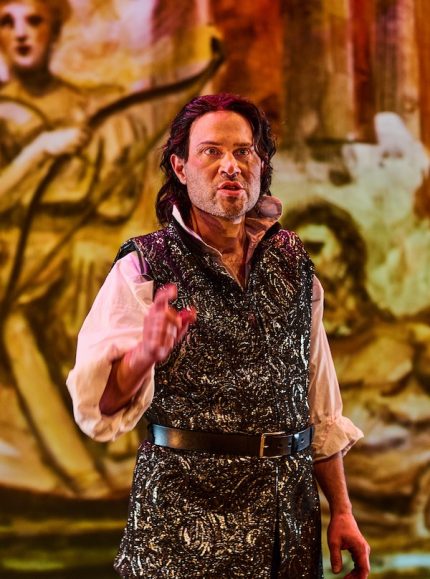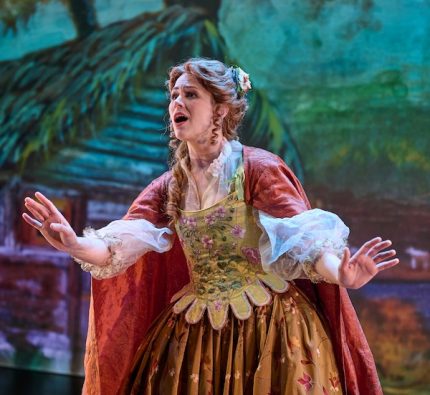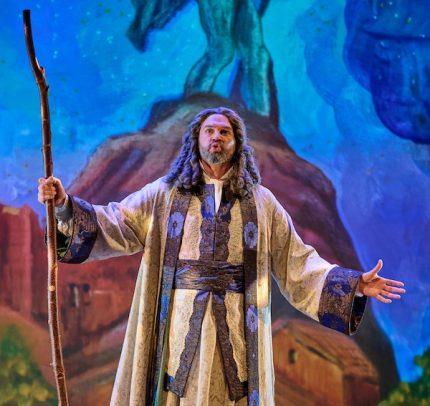Haymarket Opera reaches new heights with a magnificent “Orlando”

Live opera is finally returning to Chicago’s large stages and storefront spaces—joyous news for the scores of local aficionados. Even having to wear a mask seems like a minor annoyance to endure for the chance to experience great voices in the flesh once again.
Haymarket Opera is the sole streaming holdout, but it’s hard to argue with success. The Baroque opera company’s 10th anniversary season of streamed performances due to the pandemic has received accolades for its filmic presentations of Handel’s Acis and Galatea last October and Apollo e Dafne in March.
Now Haymarket is crowning its all-Handel year with Orlando, a sprawling full-evening opera, filmed in June and presented online. Act 1 is currently available at haymarketopera.org. (Although Haymarket Opera is releasing the stream one act at a time the complete performance was made available to reviewers.)
Haymarket’s first attempt at a big Handel opera proved something of a misfire in 2018 with an unevenly cast and sung Serse. The company clearly learned from that experience and Haymarket Opera’s Orlando is a magnificent achievement.
One feels that under the patient guidance of founder and artistic director Craig Trompeter, everything the company has done over the past decade has built on past successes and led up to this Orlando. Haymarket has refined its tradition of presenting operas in 18th-century style, from a series of elaborate and sometimes distracting hand gestures to more natural and convincing acting suited to the camera. The period-instrument Haymarket Opera Orchestra has never sounded better. And even with the unavoidable asterisk that one is hearing the singers on a recording and not live and in person, nearly all the cast deliver world-class singing and credible characterizations.
The plot of Orlando is, well, baroque. The amorous warrior Orlando is admonished by the sorcerer god Zoroastro for forsaking his heroic duties for the amorous pursuit of Angelica. Meanwhile Angelica is in love with the African prince Medoro with whom the shepherdess Dorinda is also smitten. Hilarity doesn’t quite ensue amid the romantic complications as Orlando goes insane, return to normal (more or less) and eventually all conflicts and vicissitudes are vanquished in a final chorus to love and glory.

Typically convoluted as the narrative is, Orlando is musically among the richest of Handel’s operas with a remarkably profligate stream of memorable arias for each of the five singers, as well as a pair of engaging trios.
Haymarket did well to engage a major star to lead the cast. From his entrance aria, “Stimulato dalla gloria,” Bejun Mehta immediately showed why he has won high acclaim in the title role. The countertenor made an aptly dashing Orlando, fully in synch with the headstrong, fitfully unhinged hero and looking and sounding considerably younger than his 53 years. Mehta sang with refined expression and bell-like tone, fully encompassing the varied vocal demands. He was affecting and fiery in “Vaghe pupille,” floated a sweetly sung “”Gia l’ebro mio ciglio”and tossed off the dizzying coloratura runs and fireworks of “Cielo! Se tu il consenti” and “Fammi combattere” with impressive speed and agility.
Like most Handel operas, Orlando is a true ensemble work, with several opportunities for all five cast members. Having a star like Mehta in the cast seems to have motivated Haymarket’s gifted regulars to an even higher level of vocal artistry.
It was wonderful to have the immensely gifted Emily Fons back in this production as Medoro. Though she hardly suggests an “African prince,” the mezzo-soprano’s engagingly androgynous presence made captivating impact in this trousers role. Fons was unfailingly rich of voice and brought genuine touching humanity to the dramatic moments (no matter how ridiculous). She sang beautifully and expressively throughout, and Baroque opera vocalism doesn’t get much better than the moving simplicity of expression Fons brought to “Verdi allori.”

Company stalwart Erica Schuller seems to go from strength to strength with each Haymarket production. The soprano proved a lovely and lovelorn Dorinda, singing with fine purity of tone and easy flexibility. Like Mehta and Fons, Schuller provided several high points with her sad arias, notably a moving “Quando spieighi i tuoi tormenti” and a gorgeous rendering of “Se mi rivolgo al prato.” Schuller was also delightful in “Amor e qual vento”—musing on the mind-bending tortures of love—and this humorous aria would have stopped the show had there been a live audience in the house.
Kimberly Jones as Angelica was not quite in the same league as the rest of the cast. The soprano sang capably and showed solid agility in “Non potra dirmi ingrata.” Yet she made little of Angelica’s Act 2 showpiece “Verdi piante,” and edgy top notes and wayward intonation intruded more than once, as with her pitchy “Se fedel vuoi ch’io ti creda.” Jones’ elementary acting and exaggerated expressions also seemed out of place next to the understated dramatic finesse of her colleagues.

As the sorcerer Zoroastro who, rather ineptly, attempts to control the opera’s action, bass-baritone David Govertsen was at his sturdy best, bringing weighty power and authority to every appearance and singing gloriously.
Stage director Sarah Edgar—who also made a brief cameo appearance in the silent role of Princess Isabella—deftly avoided stand-and-deliver-monotony, and aided the singers in conveying the emotional core of each aria. Likewise, Garry Grasinski’s film direction was fluent and resourceful, as with the camera swinging wildly to reflect Orlando’s temporary insanity.
Zuleyka V. Benitez’s striking artwork and projections provided colorful visuals, enhanced by Stephanie Cluggish’s elaborate costumes in a notable company debut. Haymarket’s Orlando also made history of a sort as the first production to take place in DePaul University’s new Jarvis Opera Hall.
Craig Trompeter’s conducting offered an ideal blend of buoyant urgency and lyrical warmth. The music director’s tendency for stately tempos was well suited to Orlando, with its preponderance of soulful arias. The Haymarket Opera Orchestra is now a finely honed period-instrument machine and played with fire and sensitivity as needed over this nearly three-hour score.
Haymarket Opera’s Orlando is a high-water mark for Chicago’s Baroque opera company. One hopes this successful production of a big Handel opera will bring even greater and more ambitious things to come—and with a live audience in attendance.
Haymarket Opera is releasing its filmed Orlando in weekly installments. Act I is available now, with Act 2 to be released September 23 and Act 3 on September 30. The complete opera will be available through October 31. haymarketopera.org
Posted in Uncategorized




